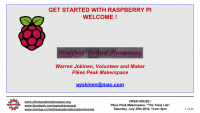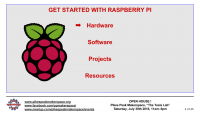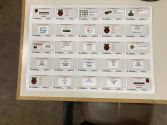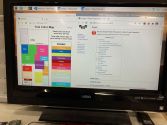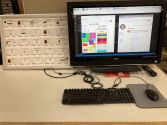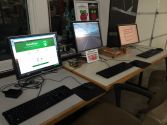Difference between revisions of "Raspberry Pi"
| Line 3: | Line 3: | ||
'''Raspberry Pi's are "single-board and modular computers or micro controllers, built on the Arm architecture, often running a Linux operating system."''' | '''Raspberry Pi's are "single-board and modular computers or micro controllers, built on the Arm architecture, often running a Linux operating system."''' | ||
| − | + | To help out with Raspberry Pi projects at PPM, post your ideas and comments on our Slack #electronics channel. | |
| − | |||
| − | |||
<br> | <br> | ||
<br> | <br> | ||
Revision as of 21:51, 30 November 2024
Raspberry Pi's are "single-board and modular computers or micro controllers, built on the Arm architecture, often running a Linux operating system."
To help out with Raspberry Pi projects at PPM, post your ideas and comments on our Slack #electronics channel.
Contact Us if you cannot find your answer here on our Wiki or if you notice any information that is outdated.
External Training
- Product Information Portal
- Raspberry Pi — official documentation
- MagPi — The official Raspberry Pi magazine
- https://store.rpipress.cc/ — Raspberry Pi PRESS
- https://magpi.raspberrypi.com/books — free downloads
- https://learn.adafruit.com/groups/learn-raspberry-pi — by Simon Monk
Past Events
- Pi Day, March 14th (3/14), is celebrated yearly often by eating pie, pizza, and/or reciting the digits of pi.
- It was started in 1988 by the Exploratorium museum in San Francisco: https://www.exploratorium.edu/pi
Tips
The Raspberry Pi was originally going be a computer that could only run the Python language.
(That is how it got the second half of its name.)
- 50 Raspberry Pi Hacks & Tips You Should Know
- Five Ways To Run a Program On Your Raspberry Pi At Startup
- Rotate the Raspberry Pi screen
- To find out which shell you're using, run the command
echo $SHELLorps $$ - List/check installed fonts
fc-list | grep "DejaVu Sans" - If the Pi 3 B+ seems slow or unresponsive, check the green light at the edge of the board for activity
- WolframMark Benchmark Results:
- Raspberry Pi 3 Model B+ (2017), 1400 MHz: 0.14
- Raspberry Pi 400, 1800 MHz: 0.23
- Raspberry Pi 4 Model B (2018), 2000 MHz: 0.24
- To find out which shell you're using, run the command
Shut down the Raspberry Pi properly:
(just pulling the plug could cause memory card corruption.)
- ☐ Use the graphical user interface (GUI), or
- ☐ Use the command:
sudo shutdown -h now
Cheat Sheets
Links to external sites:
Equipment Lists
Hardware
- 1) Raspberry Pi 3 B+ (heatsinks, no case) for our "Mall Map"
- large HDMI (VIZIO) display with remote
- 32GB SD card (no SSD)
- wired USB keyboard and mouse (Dell)
- Wi-Fi connection
- 2) Raspberry Pi with volumio audio player
- 3) Raspberry Pi from Epilog engraver area
- 4) Raspberry Pi from 3D Printer donation
- 5) "r pi 3 friendly" Dell monitors (quantity 5)
Application Software
Links to external sites:
- Raspberry Pi Imager — install Raspberry Pi OS and other operating systems
- balenaEtcher — flash or clone OS images to SD cards & USB drives
- Mathematica — free license on every Raspberry Pi
- Geany — powerful, stable and lightweight programmer's text editor
- Processing — language for learning and prototyping
- Scratch — the world’s largest coding community for children
- Sonic Pi — code-based music creation and performance tool
- tmux — allows multiple terminal sessions simultaneously
- ImageMagick — create, edit, compose, or convert digital images
- Fritzing — open source software to document, share, layout, and manufacture professional PCBs
- List of free and open-source software packages — on Wikipedia
Member Showcase
- Our Raspberry Pi-based kiosk documentation and code — on GitHub
- For even more member projects, visit our #showcase channel on Slack.
Related Pages
Links to related PPM Wiki pages:
- GitHub Tips
- Visual Studio Code Tips
- Sonic Pi Tips — code-based music creation and live performance tool
- Pi-hole Tips — network-wide ad blocking application
Hand-Curated Links
Links to member-recommended external sites:
- https://learn.sparkfun.com/tutorials/raspberry-gpio/gpio-pinout
- https://www.tomshardware.com/news/raspberry-pi
- https://octoprint.org/ — OctoPrint is a web interface for your 3D printer(s)
Links to YouTube:
- 10 years of Raspberry Pi — by Eben Upton, CEO
- Sam Aaron live coding — Sonic Pi demos
- How Raspberry Pis are made — Jeff Geerling
Links to other external sites:
- The Computers that Made Britain — Raspberry Pi Press
- Kali Linux on your Raspberry Pi 4 — pen testing platform
- Multiple Raspberry PI 3D Scanner — on AUTODESK Instructables
- SparkFun Electronics — source of Raspberry Pi's and electronic components
For Additional Help
- Use the PPM Slack channels #electronics or #general
- List of all PPM Slack channels
- Note that we have a Slack channel (#job-board) for members to post, discuss, or accept job opportunities either within PPM or from the community.
Search the PPM Wiki — include Content pages as well as Multimedia.
Contact Us if you cannot find your answer here on our Wiki or if you notice any information that is outdated.
Pikes Peak Makerspace (PPM) is dedicated to supporting our maker community in their creative processes by providing shared space, shared tools, materials, software, and a knowledge base to turn their ideas into reality.

